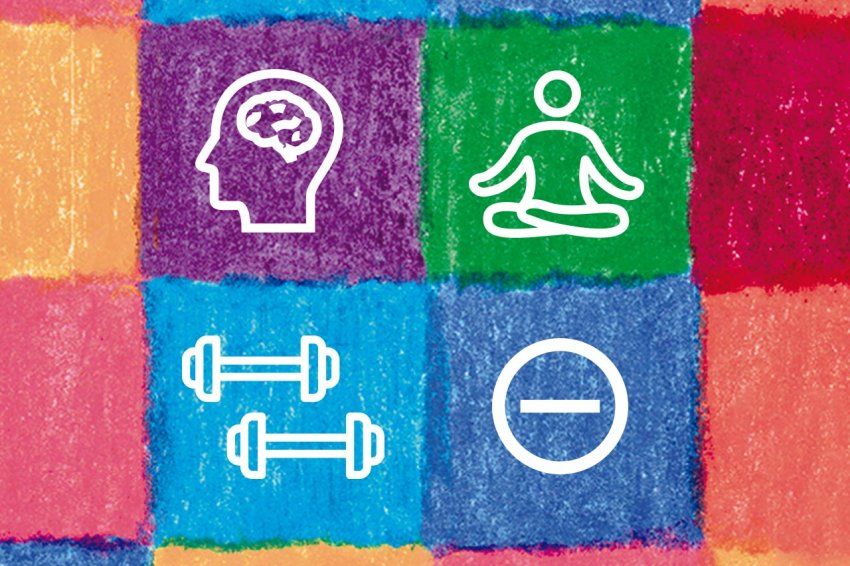
4 Strategies for Aging Well
UCSF experts share their science-backed strategies.

1. Embrace aging
Many of us experience a better balance between positive and negative emotions as we age, notes Elissa Epel, PhD, co-director of the UCSF Aging, Metabolism, and Emotions Center.
“When we’re older, we seek positive situations in our life much more and cut out things we don’t like. We take more control of our environment,” she says.
What’s more, the wisdom that often comes with age may be related to structural changes in older brains. Bruce Miller, MD, director of UCSF’s Memory and Aging Center, points to recent work showing that brain circuits involved in altruism, wisdom, and thinking about other people are shaped based on the cumulative experiences of our lives. One’s ability to consciously control emotions improves as this circuitry increases. This is why so many people can think of an older person who has had a profound influence on them, says Miller. “It’s because of the brains of elders. We are more pro-social. We are more likely to give to people in need than younger people. This is not a huge surprise ... but we’re now able to think of the biology of this. We really need our elders.”
2. Quit the negativity
Negativity and fear associated with aging often overshadow the positive aspects of growing older. Ironically, this fact can have its own damaging consequences.
“We hold these tremendously negative stereotypes about aging, and these start from when we’re really young,” Epel explains. “By the time we’re older, these are actually having a negative effect on our health.”
When we believe that aging means we’re “going to be suffering and frail and dependent,” Epel says, “we don’t heal as quickly when we break a hip. We’re more likely to get dementia, regardless of whether we have the gene associated with Alzheimer’s. And we don’t live as long.”
The most obvious explanation is that it’s a self-fulfilling prophecy: When we harbor the belief that we can’t control our rate of aging, we develop a fatalistic attitude and engage in fewer healthy behaviors. But there may be something even more insidious at work. Studies show that negative attitudes about aging can actually cause us to become more stress reactive and less stress resilient – triggering biochemical cascades that may actually accelerate aging.
3. Move more
The positive effects of physical activity on cognitive functioning in older adults are well documented. Exercise leads to the production of more brain cells, increases cardiovascular health, and promotes a sense of well-being. It also appears to be highly correlated with cognitive processing speed, says Joel Kramer, PsyD, a professor of neuropsychology who has spent more than a decade studying the super-agers among us. In a 2017 study, Kramer and his team showed that exercise may even exert a protective effect against cognitive decline in those carrying genes that place them at a greater risk for Alzheimer’s.
Meanwhile, in a 2018 study, a team led by Eli Puterman, PhD, examined a cohort of 68 elderly individuals who were caring for family members with dementia. These caregivers were under high stress, had high levels of depressive symptoms, and had sedentary lifestyles. The study encouraged participants to exercise for 40 minutes, three to five times per week, for six months. At the end of that period, participants had lengthened their telomeres, a biomarker associated with longevity.
4. Meditate
Epel and several collaborators recruited 28 participants enrolled in a California meditation retreat to undergo extensive testing. The researchers monitored markers associated with biological age (including telomere length, gene expression, and more) and also tracked participants’ anxiety, depression, and personality traits over the course of the intensive, one-month meditation retreat.
The participants meditated for extended periods under the guidance of experienced practitioners, refrained from speaking, and were encouraged to treat all daily activities as “opportunities to attend to their ongoing mental experience with open and reflexive awareness.”
At the end of the retreat, the participants’ telomere length had increased significantly, and participants with the highest initial levels of anxiety and depression showed the most dramatic changes over the course of the study.
What’s next? Epel’s team, with a $1.2 million gift from the John W. Brick Foundation for Mental Health, will study how natural treatments – including mindfulness meditation, high-intensity interval training exercise, and different breathing techniques – impact mood, health, and biological aging. At the time of publication, they are seeking women participants who could benefit from these interventions. More information and enrollment requirements are at stressresilience.net.




